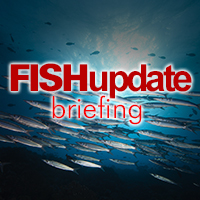Fish Update Briefing, Friday, January 26

ACTOR SPEAKS OF FISHING HERITAGE
HULL born actor Sir Tom Courtenay spoke warmly about his fishing industry heritage when he was given the freedom of the city recently. The 80-year-old star said he was dedicating his award to the trawler community of Hessle Road where he grew up, adding: ‘I got very emotional because I spoke about my early days in Hull, near the fish dock, so it means a lot to me. It was such an extraordinary sense of community there that I\’ve never encountered anywhere since. Even driving along it yesterday from the station – and the street names – which are in my brain forever.’
BRITISH FISH CHIPS COMES TO DALLAS
THE citizens of Dallas, Texas – better known for its Tex-Mex cuisine – will shortly be treated to the delights of British fish and chips when English chef Nick Barclay and his Texan born wife Kelli open their new restaurant on 400 North Colt Road in the city. The menu will feature cod and other seafood that is Marine Stewardship Council certified along with Cornish sea salt and proper malt vinegar and it will serve other British favourites like bangers and mash. Barclay told CultureMap. ‘We’ll use cod and seafood which is sourced and sustainably caught. For the batter, I’ve got my own specific recipe that’s light but with a nice golden brown crunch, and the chips will be a little fatter than what you get here in town.’
LIVE FISH SPARED THE OVEN!
STAFF at a restaurant in the Italian coastal village of Camogli, near Genoa, noticed something strange while preparing a fish for the baking tray – it was still alive and breathing! However, the chef took pity on the creature and decided to put it back into the sea. Riccardo Braghieri, owner of Cucù restaurant, saw that the fish’s gills were still opening and closing which was quite remarkable because the large grouper had been out of the water for several hours. He placed it in water so it could breathe normally before taking it down to the beach.
US CRACKDOWN ON BLACK MARKET FISH
A New United States programme to increase seafood transparency and halt the flow of illegally caught fish has formally come into operation. Known as the Seafood Import Monitoring Programme (SIMP), it demands key information accompany fish being imported into the US to get at the central question: was this fish legally caught? SIMP asks basic questions about seafood entering the US: who caught it (vessel flag and registration and the name of the species), along with data on when and where was it caught .

